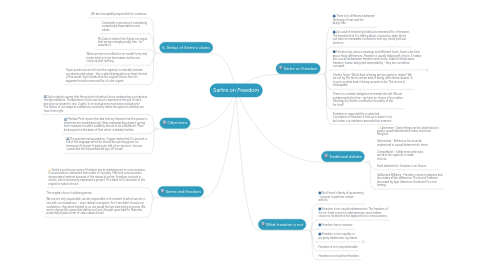Sartre on Freedom
by Anna Bromely


1. Objections
1.1. Taylor objects saying that the position of radical choice undermines our status as strong evaluators. To experience choice we have to experience the pull of each and give our assent to one. Ought I to re-evaluate my most basic evaluations? The nature of our deepest evaluations constantly raises the question whether we have them right.
1.2. Merleau-Pont rejects the idea that my freedom has the power to transform me instantaneously. New understanding doesn't spring from nowhere (couldn't suddenly decide to be a Buddhist). Must be acquired on the basis of that which is already familiar.
1.3. The spectatorial assumption: Cooper states that S's account is full of the language which he should be rejecting given his dismissal of Husserl. In particular, talk of an 'acosmic' chooser sounds like the transcendental ego of Husserl.
2. Sartre and freedom
2.1. Sartre's positive account of freedom has its starting point in consciousness. Consciousness is detached from realm of causality. Practical consciousness incorporates freedom because of the nature of action. Freedom consists in choice, which necessarily expressed a project. This leads to S's doctrine of the original or radical choice.
2.2. The original choice: totalising person. We are not only responsible, we are responsible to the extent to which we act in line with our evaluations - more radical conception. For if we didn't choose our evaluations, they were handed to us, we would feel we were being insincere. We are to choose the values that define our lives (thought goes back to Nietzshe, potentially backs a form of value subjectivism)
3. 6. Status of Sartre's claims
3.1. We are inescapably responsible for ourselves.
3.2. Constantly in process of considering competing interpretations and values
3.3. McCulloch claims that S does not argue that we are metaphysically free - he assumes it.
3.4. When we turn our reflection on ourself to try and locate what is in me that makes me free we come up with nothing.
3.5. Taylor points out we do have the capacity to radically evaluate our desires and values - this is what distinguishes us from the rest of the world. Taylor thinks that the original choice from S's argument must be removed for it to be cogent.
4. Sartre on Freedom
4.1. There is no difference between the being of man and her being-free.
4.2. Accused of endorsing totally unconstrained for of freedom. The freedom that S is talking about is buried so deep that it can have no immediate connection with any moral-political doctrine.
4.3. Freedom has various meanings and different levels, have to be clear about these differences. Freedom is usually linked with choice. S makes the crucial link between freedom and choice. Explicit link between freedom, human being and responsibility - they are correlative concepts.
4.3.1. Inspire someone about your topic?
4.3.2. Specific grade?
4.3.3. Do your best work?
4.4. Charles Taylor: Which kind of being are you going to realise? We are not by the fact a certain kind of being, with certain desires. It is up to us what kind of being we want to be. The choice in inescapable.
4.5. There is a constant obligation to remake the self. We are condemned to be free - we have no choice in the matter. Teleology for Sartre constitutes the reality of the for-itself.
4.6. Freedom or responsibility is unlimited. Conception of freedom is tied up in what it is to be human: our existence preceded our essence.
5. Traditional debate
5.1. Libertarian - Some things can be understood in purely causal/deterministic terms and some thing not. Determinist - Behaviour too must be understood in causal/deterministic terms Compatibilist - Unlike trees and rocks we have the capacity to make choices. Hard determinist - freedom is an illusion
5.2. Bernard Williams - Freedom comes in degrees and this makes all the difference. The kind of freedom discussed by Ayer (absence of restraint) is a red herring.
6. What freedom is not
6.1. Not Hume's liberty of spontaneity - a power to perform certain actions
6.2. Freedom is not causal indeterminism. The freedom of the for-itself consist in indeterminism since neither cause nor its absence has application to consciousness.
6.3. Freedom has no essence
6.4. Freedom is not a quality or property added onto my nature
6.4.1. Introduction - why are you writing about this?
6.4.2. Subhead 1
6.4.3. Subhead 2
6.4.4. Subhead 3
6.4.5. Conclusion - what summarizes what is most interesting about your topic?
